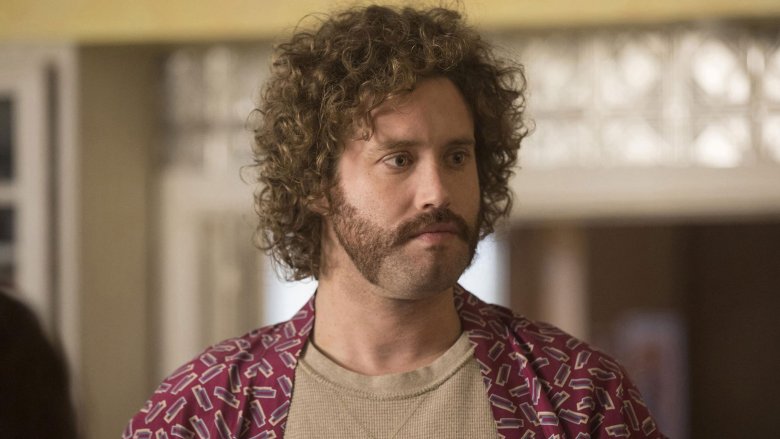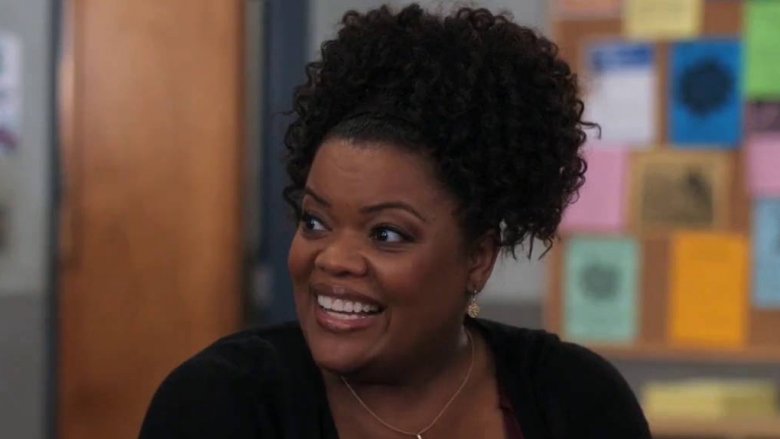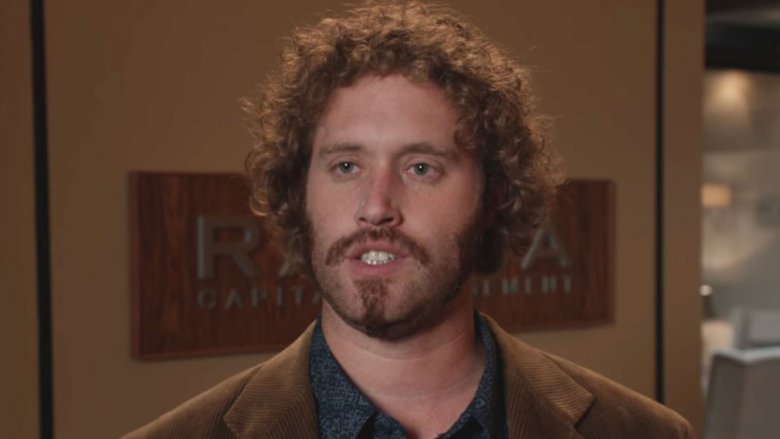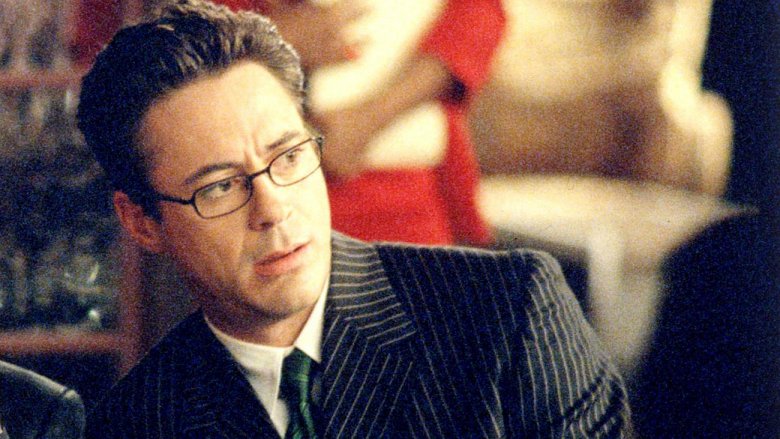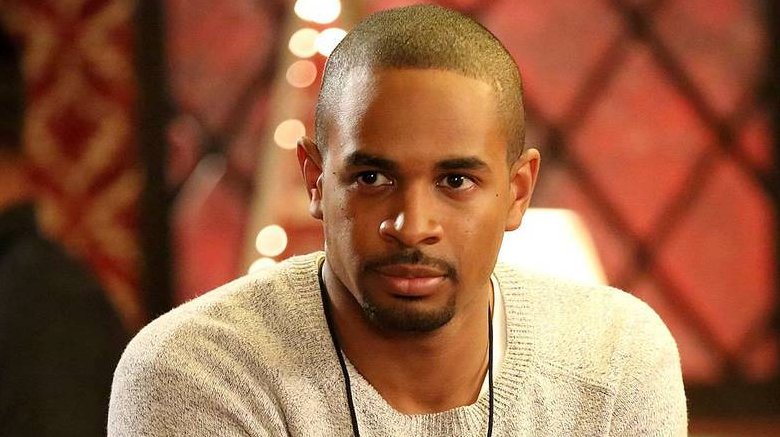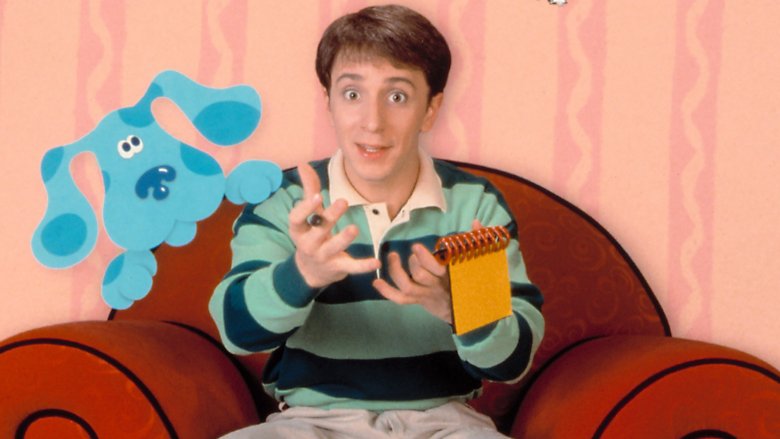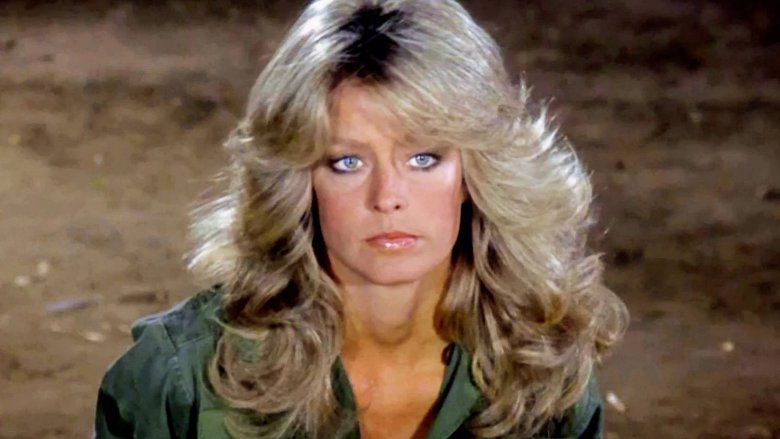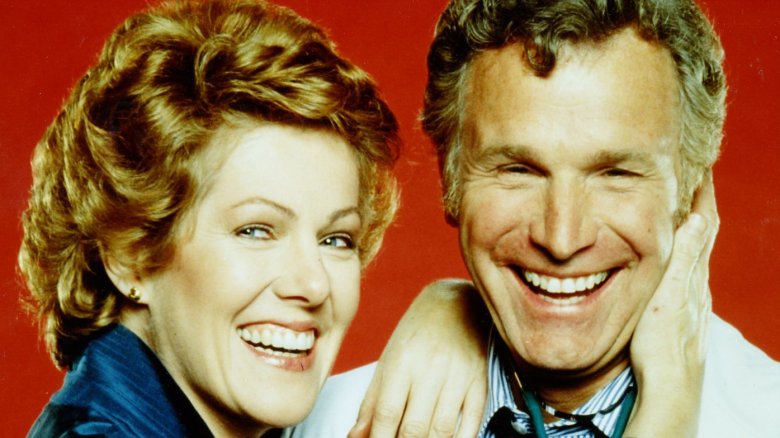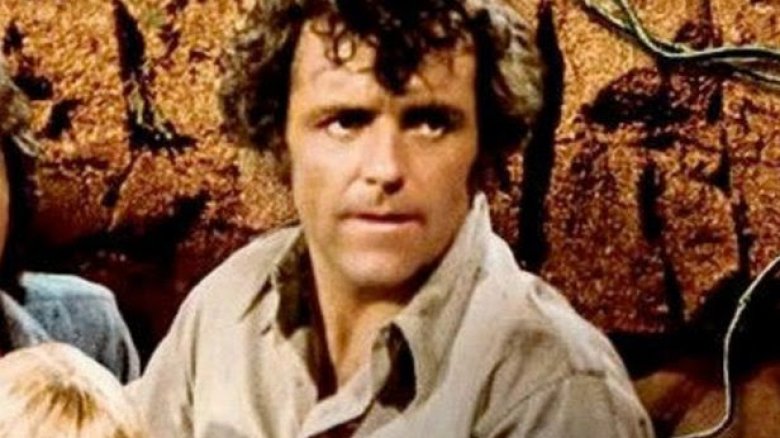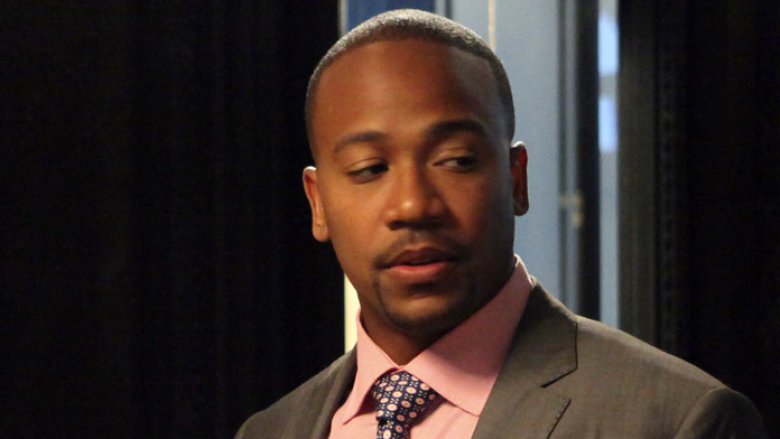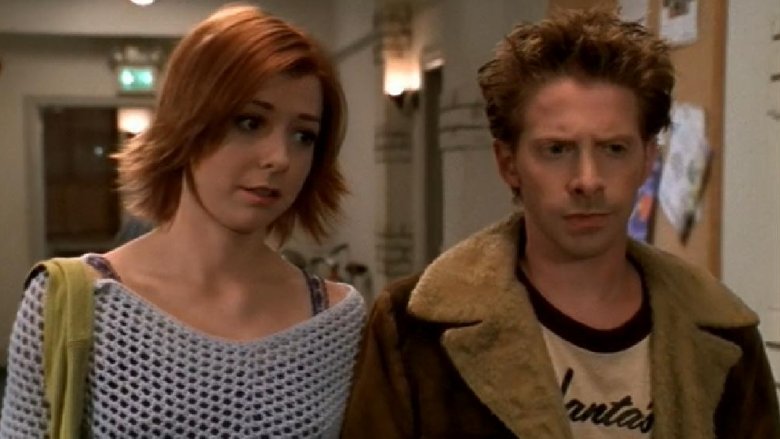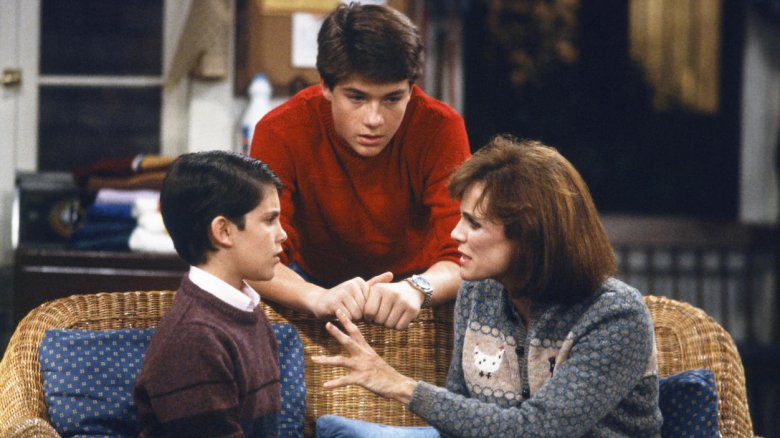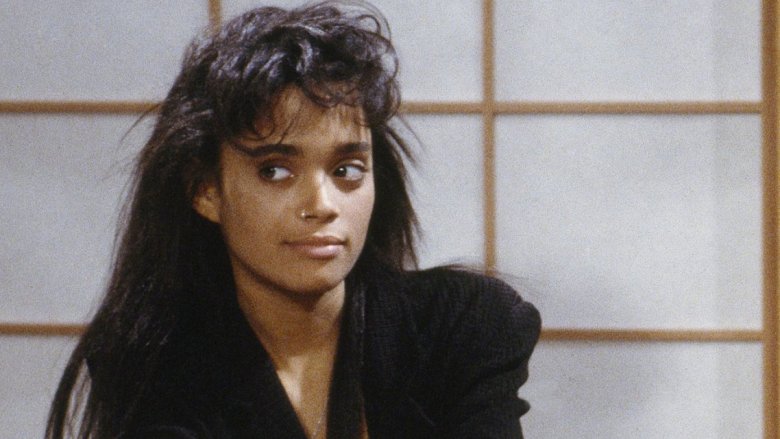Why These Characters Were Suddenly Written Off Their Shows
It's not exactly coal-mining or farming, but working on a successful television series is hard work. It's also a lot of pressure — actors not only have to be reliable, engaging performers, and proper interpreters of a writer's words, but they also serve as the public face of their shows, forever inexorably linked in viewers' minds with the character they play week in and week out.
Sometimes all that gets to be a bit much for an actor to handle. For a litany of reasons, they'll walk away from that dream of a job. That leaves their hit show in a tight spot, having to explain why a regular character isn't around anymore. Writers then figure out how to reasonably and believably "write off" the character. Here are some actors who left their television series in the middle of its run, and how the writers had to explain it to viewers.
Yvette Nicole Brown wanted a different Community
Community was a surreal and totally original comedy, which is probably why it never drew a huge audience for NBC. After five years of bad ratings, the Peacock expelled the show about a Colorado community college from its schedule. But then Community re-enrolled... on Yahoo! Screen, a new video streaming service from the former giant of search and email. Some cast members didn't make the jump, including Yvette Nicole Brown, who for five seasons portrayed Shirley Bennett, the show's voice of reason and sweetest character.
In the first episode of Yahoo-flavored Community, it's explained that Shirley left Greendale Community College to take care of her sick father, but also became a personal chef and crime-solving partner to a down-and-out detective named Butcher. In meta Community fashion, the episode ends with a fake commercial for The Butcher and the Baker, as if it were a spinoff. In reality, Brown really did leave Community to spend more time and provide care for her ailing dad.
Silicon Valley didn't compute for T.J. Miller
From episode one of the HBO tech satire Silicon Valley, T.J. Miller portrayed Erlich Bachman, an exploitative industry hanger-on. At the end of the show's fourth season, Bachman disappeared, traveling to Asia to meet with Gavin Belson, draconian CEO of Google-like Hooli, who pays the operator of an opium den enough money to keep Erlich permanently stoned and out of the way for five years.
"It was kind of becoming clear that he didn't want to do the show anymore," co-creator Mike Judge told The Hollywood Reporter. "When the season was done, we talked to T.J. and said, 'Do you want to come back for part of it?' And he just wanted to move on." Miller gave the same publication a little more detail, claiming that the show wanted to reduce his workload from 10 episodes to just three or five. "And then I said, ' "Oh perfect, I had been wanting to ask if you guys would be open to me leaving the show," Miller said.
As for why the show wanted to at least partially do away with Miller and his character, Judge later told The Hollywood Reporter that the actor became increasingly difficult. Miller reportedly showed up late and unprepared to table reads and tapings, or according to Judge, sometimes not at all. "It's not fun to work with someone who doesn't want to be there," he said.
Real-life legal problems meant Robert Downey Jr. couldn't play a lawyer
Robert Downey, Jr. staged an impressive comeback. After appearing in '80s comedies like Weird Science and Back to School, Downey transitioned into a fine dramatic actor, earning an Oscar nomination for Chaplin. Today, he's one of the most popular movie stars in the world — he is Iron Man — but in the '90s, things got way off track for Downey due to drug abuse. In the summer of 1996, California police stopped Downey for speeding and found cocaine and heroin in his vehicle, and a month later, he was discovered passed out in a neighbor's house, and was arrested again after he fled a rehab center. In 1999, he skipped court-mandated drug tests and was sentenced to hard time.
By 2000, Downey had started his climb back up the Hollywood ladder, winning a role on the legal dramedy Ally McBeal as Larry Paul, a charming love interest for the titular character (Calista Flockhart). Creator David E. Kelly abruptly wrote Larry out of the show's fourth season finale in 2001 because Downey suffered a drug and legal relapse. Police stopped Downey when they spotted him walking erratically down a street in Culver City, California. A urine sample revealed drugs in his system — a major violation of his parole — and he subsequently checked into rehab. Downey eventually returned to Ally McBeal, albeit with a rewritten character arc.
The coach who took himself out
The producers of New Girl, a show built around star Zooey Deschanel, assembled a talented supporting cast, including Max Greenfield, Jake Johnson, and Damon Wayans, Jr., previously best known for his role as Brad on ABC's silly cult hit Happy Endings. That show struggled in the ratings, and Wayans figured it would get canceled, and thus he planned for the future in 2011 by taking the role as Coach in the plot for New Girl.
Fox picked up New Girl for its fall schedule... and ABC surprisingly renewed Happy Endings. His contract for the old show took precedence over his agreement with New Girl. Wayans returned to Happy Endings, and the pilot episode of New Girl aired. On episode number two, actor Lamorne Morris joined the cast as Winston, a failed pro basketball player and ostensible replacement for Coach. No reason for Coach's absence was given, but after Happy Endings', uh, ending, Wayans returned to New Girl to play Coach for a while longer.
Steve Burns figured it out
Steve Burns portrayed "Steve" on Nickelodeon's Blues Clues, a hybrid animation/live-action series where kids helped a cute blue dog named Blue — and a human friend — solve riddles. After six years of talking directly to the preschool-age audience at home through the TV box, Burns decided to leave the show... before he got typecast as the sweet-but-dorky Steve forever. "I knew I wasn't gonna be doing children's television all my life, mostly because I refused to lose my hair on a kid's TV show, and it was happening. Fast," Burns said in the special Behind the Clues: 10 Years with Blue (via The Huffington Post). While he may have actually been dealing with alopecia, not wanting to go bald on TV could also be interpreted as a metaphor for "time to move on."
As Blue's Clues had a very young and sensitive audience, Burns' exit from the show would need to be handled very delicately, so Nickelodeon made a special episode that explained Steve was going away to college, but that Blue would stay behind to solve riddles with Steve's little brother, Joe, portrayed by actor Donovan Patton.
Farrah Fawcett had better things to do
In 1977, Farrah Fawcett left her role as scantily-clad secret agent Jill Munroe on Charlie's Angels just one year into its run. It seemed like she was capitalizing on her success, using the show to jump to a movie career, which never quite came. Fawcett spent the rest of her career appearing primarily on short-lived TV shows and the occasional miniseries.
But according to the late actress herself on a 1987 appearance on The Tonight Show, the truth is a bit more complicated. "I loved the girls and everyone associated with the show, but I had very strong feelings about my character and things that should happen, and they disagreed," Fawcett said, the "they" referring to Charlie's Angels writers and producers. "I thought that they should go into a little more character development of each girl," Fawcett elaborated. But the show's creative team was quite content with the formula that had made the show a success — action, and attractive women in tank tops. Fawcett decided to leave; as for Jill, she moved to Europe to become a LeMans driver.
Oh baby, did Lynn Redgrave get railroaded
The hit 1979-1982 CBS sitcom House Calls starred Academy Award-nominated actress Lynn Redgrave as hospital administrator Ann Atkinson and former M*A*S*H cast member Wayne Rogers as the suave Dr. Charley Michaels. Ann doesn't want to fall in love with Charley... but then just guess what happens. That budding romance came to a sudden and confusing halt at the beginning of the show's third season in 1981, as Ann suddenly disappeared from House Calls. It's explained in a letter that Charley reads aloud — Ann returned to her home country of England, and that was that.
That explains where Ann went, but what about Redgrave? House Calls producer Universal Television claimed that it let Redgrave out of her contract, reportedly at her request, because it wouldn't finance her boutique production company or double her per-episode pay. Redgrave remembers things a little differently. She'd just given birth to a baby girl, and wanted to bring her to work. "It would break my heart to leave her," Redgrave told People. Also, Redgrave wanted to be able to breastfeed in her dressing room between takes. Producers refused, so that's why Redgrave asked to be let go.
Spencer Milligan told Land of the Lost to get lost
After the cartoons finished late on Saturday mornings in the '70s, kids still had one more TV treat to enjoy: Land of the Lost, the adventures of dad Rick Marshall and his kids, Will and Holly, who wind up in an alternate universe populated by dinosaurs and the vicious humanoid Sleestaks. Each week, Rick (Spencer Milligan) and his children (Wesley Eure and Kathy Coleman) struggled to survive and tried to make it back home from this nightmarish otherworld, and in the third season premiere in 1976, they did. Okay, well, Rick did. An earthquake cracked the ground open, and Rick fell inside, which transported him back to, presumably, 1970s America. At the same time, Rick's brother Jack (Ron Harper) fell through time, winding up as Will and Holly's new guardian.
Milligan quit the show because of a salary dispute, specifically a disagreement about payments for Land of the Lost merchandise. "We had a difference of opinion, let's put it this way, on using my face for stuff and paying me — lunch boxes, compasses — where they were selling them," Milligan said on NBC's Today in 2010. "I thought it was only fair that everyone should get their fair share."
Scandal onscreen and off for Columbus Short
Throughout the run of Scandal, crisis management expert Olivia Pope (Kerry Washington) employed the help of several associates whom she called her "gladiators." Among them: Harrison Wright (Columbus Short), who, like many other Scandal characters, met his doom at the hands of Eli Pope, a coldblooded killer and head of a top-secret CIA division. At the end of Scandal's third season, Harrison learns that it was Eli who'd killed Jerry Grant, the President and First Lady's young son, and that he had plans to take out Jerry's parents, too.
While that made it pretty clear neither Harrison Wright nor Columbus Short would be back to Scandal, the actor announced two days after the episode aired in April 2014 that he'd quit the show. In addition to a slew of legal problems, which, according to TMZ, included charges of spousal battery and punching a man in a bar, Short told Access Hollywood Live (via New York Daily News) that he'd left the show because of a problem with cocaine. "I had a lot on my plate, and you know, I was using unhealthy ways to kind of self-medicate and deal with a lot of heavy stuff in my life," Short said, adding that Scandal creator Shonda Rhimes helped facilitate his exit from the show so he could "get my stuff together."
Seth Green took a journey away from Oz
Thanks to his work as Scott Evil in the Austin Powers movies, Seth Green was arguably the most famous cast member in the early years of Buffy the Vampire Slayer. Still, he played a supporting role on the series: Daniel "Oz" Osbourne, Sunnydale High student, budding rock musician, nice boyfriend to Willow Rosenberg (Alyson Hannigan), and, oh yes, a werewolf. Green kicked around the show until early in the fourth season, when he left to shoot the gangster comedy Knockaround Guys.
Buffy creator Joss Whedon once had big plans for the character, namely to explore the dynamic between Oz and a female werewolf named Veruca. Instead, Oz killed Veruca, and left town to study how to control his supernatural impulses. However, leaving Oz's girlfriend, Willow, heartbroken and single spurred the idea to explore that character's sexuality. Before long, Willow was one of the few LGBT characters on TV at the time.
How Valerie Harper inadvertently created The Hogan Family
NBC's Valerie was a vehicle for Valerie Harper, star of '70s favorites The Mary Tyler Moore Show and Rhoda. What made Valerie different from the other many family sitcoms of the mid-'80s was that the mom, Valerie Hogan, worked outside of the home and raised three boys more or less on her own because her husband worked as a pilot and was usually out of town. Other than that, it was typically corny and sweet — at least until the show abruptly and shockingly killed off Harper's character. When the third season of Valerie, retitled Valerie's Family and then The Hogan Family, premiered in September 1987, Valerie Hogan had died in a car accident and the kids' aunt, Sandy (Sandy Duncan), had moved in.
What happened? In the summer of 1987, Harper asked production company Lorimar Television for a salary increase. It refused, so Harper didn't report to work to shoot the season premiere. Both sides reached what appeared to be a tentative deal, but once again Harper failed to show up. So Lorimar fired Harper, publicly announced that they'd kill off Valerie Hogan, and sued the actress for $70 million, citing breach of contract. Harper countersued for breach of contract, asking for $180 million in damages. After a long legal battle, a jury sided with Harper, believing she'd been wrongfully terminated, and awarded her $1.4 million.
It was a different world for Lisa Bonet
The Cosby Show enjoyed phenomenal popularity in its first few seasons, ranking as the most-watched show on TV for five straight seasons. It elevated Lisa Bonet, who played second-oldest Huxtable child Denise, into a teen idol and style icon. Bonet and Denise were so popular that Bill Cosby developed a spinoff: A Different World, which found Denise attending her father's alma mater, the prestigious Hillman College. That show finished its first season (1987–88) at #2 in the ratings...trailing only The Cosby Show.
Nevertheless, A Different World got retooled for season two: Debbie Allen came on to direct and produce, Aretha Franklin re-recorded the theme song... and Denise Huxtable was gone. The series continued on as a thoughtful, socially conscious comedy about the African-American college experience, and Denise returned to The Cosby Show, disappointing her parents because she'd dropped out of school. The impetus for the return home: Lisa Bonet got pregnant, and A Different World writers didn't want to explore that plot. Neither did Cosby Show writers, so Denise stood behind furniture a lot.
